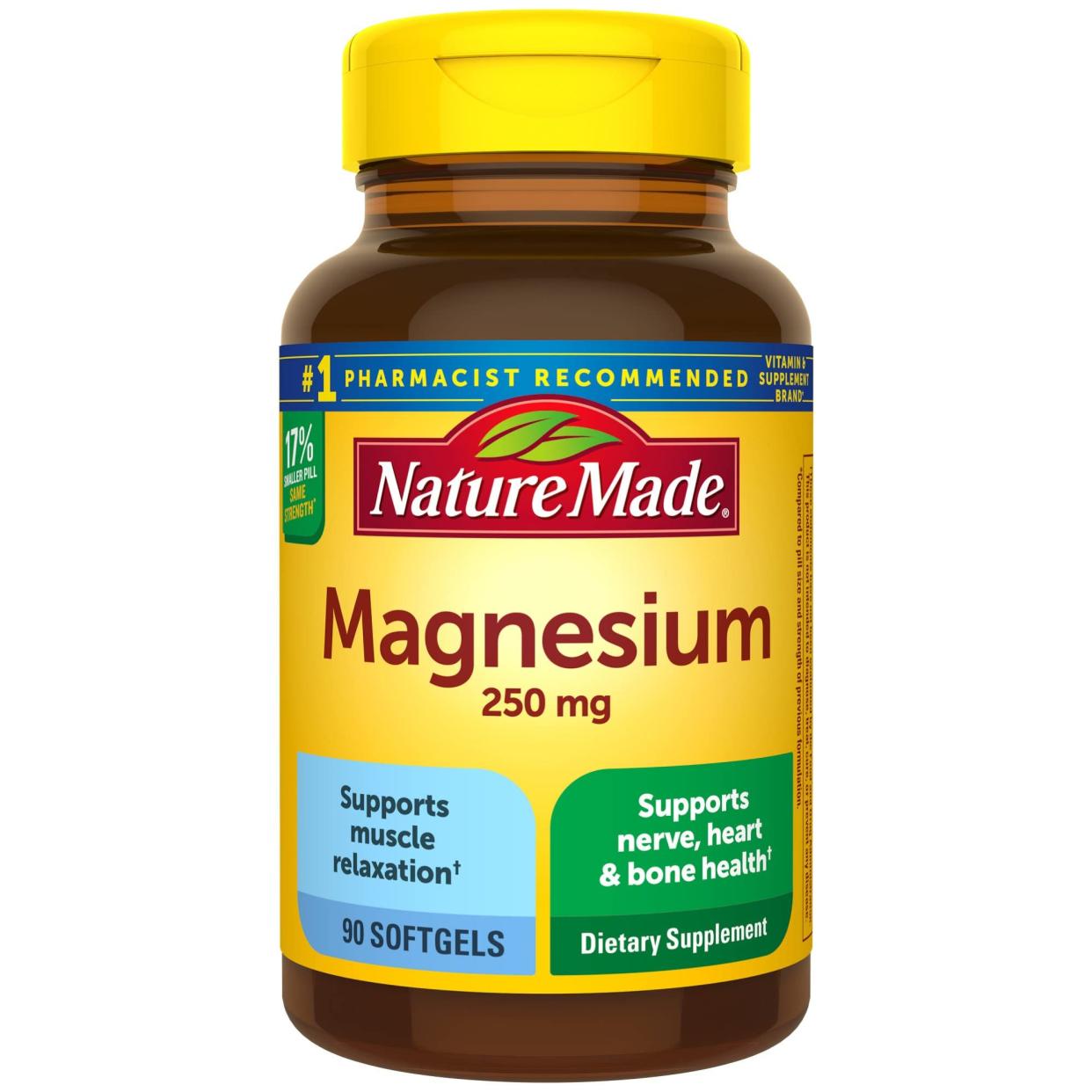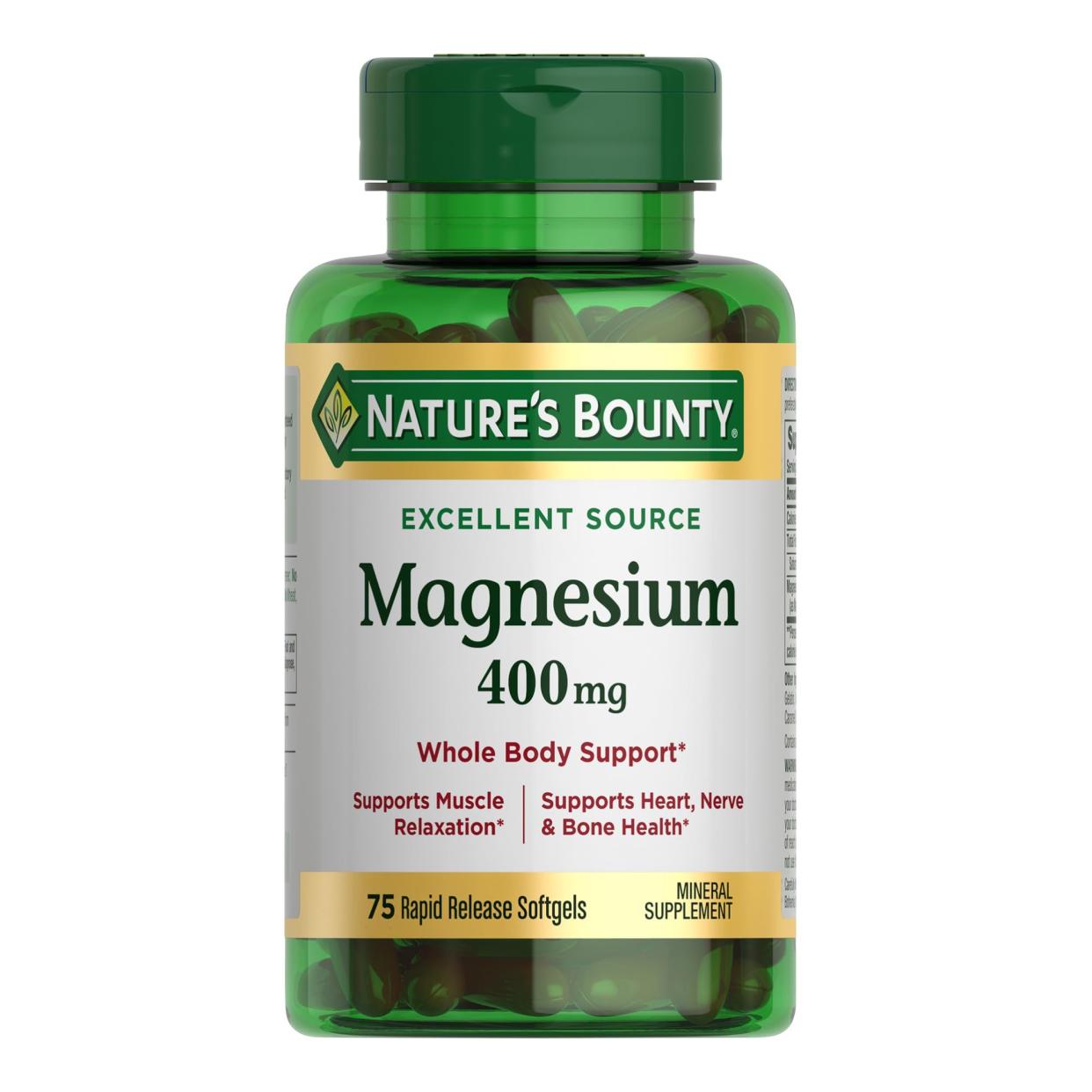So, When Is the Best Time to Take Magnesium? Experts Explain
"Hearst Magazines and Yahoo may earn commission or revenue on some items through these links."
[table-of-contents] stripped
Only about 50% of Americans get the level of magnesium they need, making this a supplement to have on your radar. If you’re planning to take a magnesium supplement, it only makes sense to want to get the most out of it. That can mean taking it with food or even spacing out when you take it compared to your other medications. So, when is the best time to take magnesium?
Like many supplements, there is some flexibility here. But if you want to make the most out of it, nutritionists say there are a few things to keep in mind.
Meet the experts: Deborah Cohen, D.C.N., is an associate professor in the department of clinical and preventive nutrition sciences at Rutgers University School of Health Professions; Keri Gans, R.D., is author of The Small Change Diet; Jessica Cording, M.S., R.D., is author of The Little Book of Game-Changers: 50 Healthy Habits For Managing Stress & Anxiety.
Here’s what you need to know about when to take magnesium, plus what the supplement can do for you in the first place.
Magnesium benefits
Magnesium does a lot for your body. “Magnesium is the fourth most abundant element in the body, after calcium, potassium, and sodium,” says Deborah Cohen, D.C.N., an associate professor in the department of clinical and preventive nutrition sciences at Rutgers University School of Health Professions. “Magnesium is an important component of bone, muscles, soft tissues, and organs.”
The element is a co-factor—meaning, it’s involved in—more than 300 enzyme reactions in the body, according to the National Institutes of Health (NIH). “Magnesium is responsible for a host of functions in your body including regulating blood sugar levels, nerve and muscle function, lowering blood pressure, and bone production,” says Keri Gans, R.D., author of The Small Change Diet.
When is the best time to take magnesium?
It depends. In general, magnesium isn’t a fussy supplement. Meaning, you don’t need to take it at an exact time of day to get benefits. “The best time to take magnesium is whenever you will remember to and then be consistent with it daily,” Gans says.
But it may be a good idea to take your magnesium supplement with food, Cohen says. “Taking magnesium supplements on an empty stomach can cause diarrhea,” she points out.
Of course, there are a lot of different types of magnesium and each is a little different. These are the most common ones you’ll likely come across, plus when to take them.
Magnesium oxide: This is the most common type found in supplements. It's an inorganic salt of magnesium that's formed with ions of magnesium and oxygen, and it's used to treat a range of health issues, including headaches and constipation. Some people will take it at night with food to help them have a bowel movement when they wake up in the morning, Cording says.
Magnesium hydroxide: This form is used to treat occasional constipation, as well as acid reflux. Magnesium hydroxide is usually a medication that people take when they need it, Cording says.
Magnesium glycinate: This is made from a combination of magnesium and an amino acid called glycine, per the Mayo Clinic. It’s usually marketed to help with relaxation, sleep, and mood, but those claims haven’t been proven in studies on humans. Still, Cording says there’s no harm in taking it before bed—and you can take it daily.
Magnesium citrate: A highly absorbable form of magnesium, this is usually used to treat occasional constipation. This can be taken any time of day, per Cording. It usually causes a bowel movement within a half hour to six hours after you take it, Medline Plus notes.
How much magnesium do you need daily?
The recommended daily intake (RDI) of magnesium varies depending on factors like your sex and whether you’re pregnant or breastfeeding. However, it’s generally recommended that adult women get between 310—400 milligrams of magnesium a day, while adult men should strive for 400—420 milligrams a day.
Who should take magnesium supplements?
Everyone needs magnesium, but people with certain health conditions like some gastrointestinal diseases or hyperthyroidism, may benefit from taking a supplement. Still, in most cases it’s best to focus on eating magnesium-rich foods first.
“I generally recommend that people try to get nutrients from food first,” says Jessica Cording, M.S., R.D., author of The Little Book of Game-Changers: 50 Healthy Habits For Managing Stress & Anxiety. Adding more magnesium-rich foods like pumpkin seeds, chia seeds, spinach, peanuts, and edamame to your diet can help meet your needs, she says.
Possible interactions
Cohen recommends checking with your doctor before taking a magnesium supplement to make sure it won’t interfere with any medications you’re on or health conditions you may have.
There are a few drugs that can interact with magnesium supplements, per the NIH. Those include:
Bisphosphonates. It’s best to separate magnesium and bisphosphonates by at least two hours.
Some antibiotics. Tetracyclines, ciprofloxacin, and levofloxacin can all interact with magnesium. They should be taken at least two hours before or four to six hours after taking a magnesium supplement.
Diuretics. Loop diuretics like furosemide and bumetanide, and thiazide diuretics like hydrochlorothiazide and ethacrynic acid can cause magnesium depletion. Potassium-sparing diuretics like amiloride and spironolactone reduce how much magnesium is excreted by the body.
Proton pump inhibitors. When taken for long periods, prescription proton pump inhibitors like esomeprazole magnesium and lansoprazole can cause a magnesium deficiency.
Still, for most people, “doses less than 450 milligrams a day appear to be relatively safe,” Cohen says. “However, people with diabetes, heart disease, or kidney disease should talk with their physician before starting a magnesium supplement.”
The best magnesium supplements
Again, the best way to approach taking a magnesium supplement is to check in with your doctor first, Cording says. They may want to check your magnesium levels first to recommend a proper dose for you.
But, as a whole, Cording suggests looking for magnesium supplements that are third-party tested. Because supplements are a largely unregulated industry, having this designation ensures that what the label says is what’s actually inside your supplement, she explains.
Magnesium 250 mg

Magnesium 250 mg
amazon.com
$9.99
Triple Magnesium Complex

Triple Magnesium Complex
amazon.com
$27.99
Magnesium

Magnesium
amazon.com
$10.20
Dietary supplements are products intended to supplement the diet. They are not medicines and are not intended to treat, diagnose, mitigate, prevent, or cure diseases. Be cautious about taking dietary supplements if you are pregnant or nursing. Also, be careful about giving supplements to a child, unless recommended by their healthcare provider.
You Might Also Like
